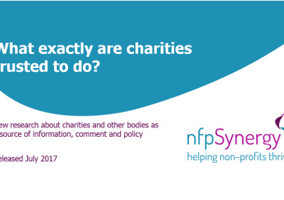Charities must help the public to understand the way they work, rather than concealing it, the chair of NCVO has said.
Peter Kellner, writing in an essay for think tank NPC, said that charities could either be like rocket manufacturers – who judge that the more the public know about how their product is made, the more they will approve – or sausage manufacturers, who believe that the public will approve more if they conceal how their product is made.
In an essay entitled Rockets not sausages: let’s take a ‘trust-plus’ approach to the public, Kellner said charities need to take a “trust-plus” approach in which it did not just focus on transparency, but actively tried to communicate to the public how the sector really operated.
“By default rather than design, charities behave too often like sausage manufacturers,” he wrote.
“The sector needs to go beyond avoiding insolvency and respecting the latest rules regarding fundraising and donor databases,” he said. “It needs to act, and to persuade the wider public that it is acting to innovate, to increase efficiency and to have greater impact on the lives of people they have been set up to help.
“One of the sector’s great secrets is that the best charities already do this. Since becoming chair of NCVO, I have been struck by the professionalism as well as the dedication of many of our members. They have IT networks, financial controls, human resource departments, management training, research departments, impact measurement systems and property negotiators that can stand comparison with the best of the private sector.
“Yet these are hidden from public view.”
Charities need to make the case about being professional organisations
He said this explained why the public remained angry over the amount that charity chief executives were paid – because charities had not made the case that they were complex, professional organisations.
He said charities needed to make the case that they needed the best staff, not the most well-meaning, and ought to pay for them.
“Making this case will not be easy,” he said. “For obvious reasons, fundraising campaigns tend to concentrate on front-line activity: a hungry baby being fed, a sick parent being treated, an elderly person in a care home.
“We need a new narrative, one that demonstrates that the sector has big brains as well as big hearts. This in turn requires a culture of greater openness that goes beyond a box-ticking policy of formal transparency.
“It needs a greater willingness to explain how charities are managed, and how their professionalism ensures that donor’s money is well spent. To make ‘trust-plus’ work we need to generate enthusiasm not just for what we do, but a real understanding of how we do it. We need to make sure we’re building rockets and not making sausages.”
Related articles












